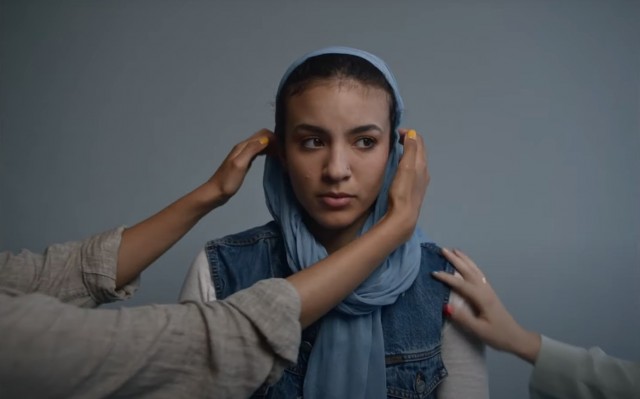Rumi is a young aspiring actress, so when she gets street cast and invited to a photoshoot, how could she possibly turn that opportunity down? However, the confidence boost that comes from that recognition slowly turns into an insidious humiliation. In Rumi, writer/director Aisha Amin cleverly sheds light on one of the many problematic sides of the fashion industry, with a subtle approach that grasps her titular character’s emotional journey through that experience.
“Making Rumi was my attempt to investigate the experience of being a Muslim woman in an industry built around appearances”
When we asked Amin what prompted her to pen the screenplay, she shared with us that what initiated the project was the hypocrisy of “the emergence of headscarves in a number of designer collections” at a Paris Fashion Week, when religious signs, thus hijabs, are forbidden in French schools. “Making Rumi was my attempt to investigate the experience of being a Muslim woman in an industry built around appearances, performance and tokenism”, she added. Following some research into the modeling world, Amin discovered that “certain behaviors are pushed under the rug in the name of ‘fashion’” and from there her narrative was born.
It came as no surprise when the filmmaker confessed to us that what happens to Rumi in the film is heavily inspired by what has happened to actual hijabi models. But the film is not merely about this fact, which we can only imagine is a regular occurrence, as the film also focuses on how Rumi internally deals with such a hard realization. When the film begins, she delivers a strong performance that her teacher and peers applaud and it’s evident from this, that her confidence is high. Then, when a casting agent tells her to attend an open call, her morale is boosted even higher, as a gatekeeper from the outside world is validating her. Once there, the rug slowly gets pulled from under her, as first she begins to understand why she was actually invited and then slowly gets disrespected and violated, while at her most vulnerable.
“My goal as the director was to question the power dynamic involved in watching women who become vulnerable”
From the cinematography to the sound design, once they start touching her and pulling back her hijab, the film almost turns into a psychological horror. Initially making the audience uncomfortable, it slowly but effectively transitions into an anger laced with terror. As her situation worsens and she sits frozen, not able to make a single move, we as the audience are forced into the role of voyeur, as Amin explains: “My goal as the director was to question the power dynamic involved in watching women who become vulnerable, violated and stripped of their autonomy. What role do we have in this as audience members?”

“I worked with Zina for a few months to merge her own personal characteristics with that of Rumi’s” – director Aisha Amin on collaborating with lead actor Zina Louhaichy.
This scene grounds itself so heavily thanks to lead actress Zina Louhaichy’s remarkable performance. According to Amin, the casting procedure was long and unconventional, compared to her usual process, but when she found Louhaichy, an acting student in NYC, they developed the character together. Louhaichy starts the film strong, with the mise en abyme scene where she delivers a powerful monologue as her character. However, it is in that last scene, where without saying a single word, she is utterly captivating, as we experience all her inner turmoil through her eyes. Her stillness and expression poignantly capturing exactly what is happening to her and conveying all the nuances of the infuriating and humiliating experience.
With Rumi the second short of Amin’s featured on S/W in the last 10-months, after the impressive Simone, the filmmaker already has multiple projects in the pipeline. Including a short narrative film about a deaf couple realizing that their relationship has run its course, a tv pilot about a documentary filmmaker who follows her friend on the campaign trail and a genre feature set in Kenya, within an Evangelical mission group.

 Céline Roustan
Céline Roustan